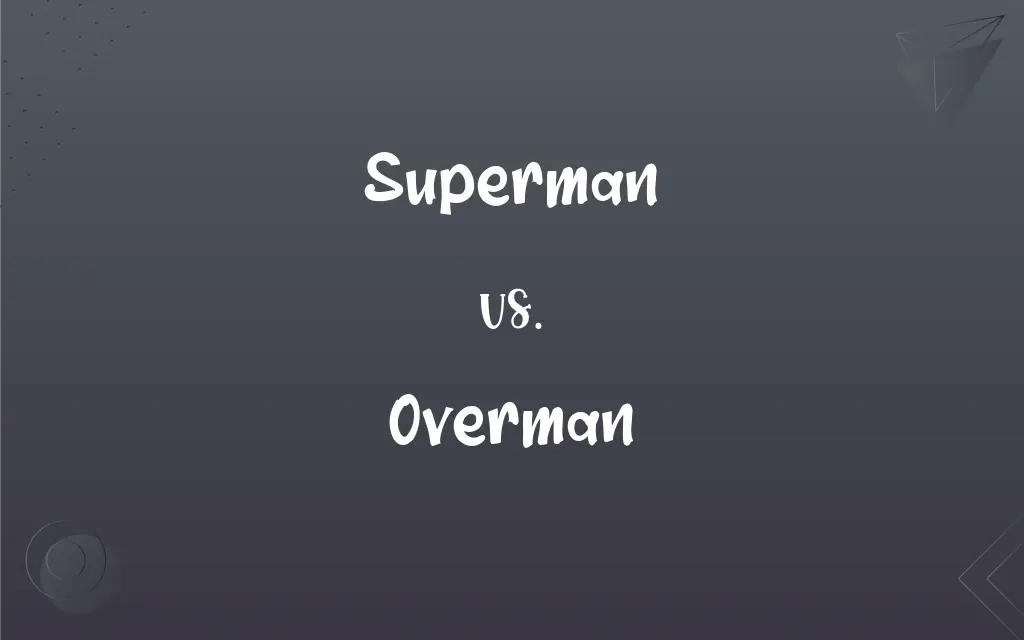Superman vs. Overman: What's the Difference?
Edited by Aimie Carlson || By Janet White || Updated on October 10, 2023
Superman, mainly known from DC Comics, is a fictional superhero with extraordinary powers, while Overman, derived from Nietzsche’s philosophy, refers to a transcendent individual who overcomes human limitations and creates new values.

Key Differences
Superman is widely recognized as a fictional character, iconic in American pop culture, symbolizing strength, morality, and justice, with an alter ego, Clark Kent. The character represents a superhero, embodying unattainable physical strength and moral purity, often fighting for truth, justice, and the American way. His creation by Jerry Siegel and Joe Shuster in the 1930s brought forth a character that continues to symbolize a benevolent protector with almost god-like powers, illustrating a fantastical escape and moral symbolism.
Overman (or "Übermensch" in German) is a concept presented by philosopher Friedrich Nietzsche, symbolizing a being who has transcended the norms, morals, and values of society, creating their own values and meaning. The Overman is not driven by societal norms but instead creates new values, free from traditional moral and societal constraints. Nietzsche's Overman represents a future ideal, an individual who can rise above the herd morality and establish a new way of conceiving existence, embracing eternal recurrence and creating values.
The Superman character, originating in comic books, has been adapted into various forms of media, becoming an emblem of heroism in society. He possesses physical capabilities far surpassing those of regular humans, such as the ability to fly, super-strength, and x-ray vision. These extraordinary abilities are often employed to combat villains and defend humanity from various threats, embodying an eternal struggle between good and evil within a fantastical context.
Overman, as defined by Nietzsche, isn’t concerned with good and evil in a traditional moral sense. This concept critiques the inherent structures of established morality, implying a transvaluation of all values. Nietzsche's Overman isn’t conceived as a protector or savior of others but as an individual who has the power and will to redefine values, urging society to look beyond its conventional moral codes and aspire to a higher, self-determined mode of being.
Exploring the visual and cultural impact, Superman is often depicted wearing a blue costume, red cape, and a stylized red-and-yellow "S" shield on his chest, representing an unmistakable image in popular culture. His narratives often involve balancing superhero deeds with his disguised life as Clark Kent, intertwining themes of secrecy, dual identity, and moral responsibility within his storyline.
ADVERTISEMENT
In contrast, Overman isn’t associated with a specific image or iconography but is embedded within philosophical texts and discourses, primarily Nietzsche's "Thus Spoke Zarathustra". The concept doesn’t derive from visual or narrative media but is dissected through philosophical analysis and dialogues, reflecting its depth and the complexity of its existential and ethical themes.
Comparison Chart
Nature
Fictional superhero
Philosophical concept
Origin
Comic books
Nietzsche’s philosophy
Role
Protector and savior
Individual transcending norms
Moral Standing
Upholds prevailing morality
Challenges and redefines morality
ADVERTISEMENT
Representation
Specific visual representation
Abstract and theoretical
Superman and Overman Definitions
Superman
A fictional superhero in American comic books published by DC Comics.
Superman soared through the sky, rushing to thwart the villain’s plans.
Overman
A philosophical concept of a being who transcends traditional human limitations.
Nietzsche’s Overman seeks to impose their own values on the world.
Superman
A character possessing superhuman strength and abilities.
Superman lifted the entire building effortlessly, saving everyone inside.
Overman
A symbolic representation of the aspiration to transcend human norms.
Overman, as a concept, challenges us to look beyond our conventional moral boundaries.
Superman
An embodiment of American cultural and moral ideals.
Superman, with his unwavering moral compass, became a symbol of American values.
Overman
A theoretical figure who embodies Nietzsche's critique of established values.
Through the lens of the Overman, Nietzsche scrutinized Christian morality.
Superman
A character often involved in narratives that balance moral dilemmas and action.
Superman grappled with the moral implications of utilizing his immense power.
Overman
Not a savior or protector but a creator of new values and meanings.
Unlike benevolent leaders, the Overman isn’t inherently concerned with societal welfare.
Superman
An alien from the planet Krypton, living on Earth as Clark Kent.
Though he originates from Krypton, Superman has made Earth his home.
Overman
A person having authority over others, especially an overseer or a shift supervisor.
Superman
A man with more than human powers.
Overman
(ōvər-măn′) See superman.
Superman
An ideal superior man who, according to Nietzsche, forgoes transient pleasure, exercises creative power, lives at a level of experience beyond standards of good and evil, and is the goal of human evolution. Also called overman.
Overman
To provide with more personnel than necessary.
Superman
An imagined superior type of human being representing a new stage of human development; an übermensch, an overman.
Nietzsche wrote of the coming of the superman.
Overman
A person who supervises others; a supervisor, especially in a mine.
Superman
A person of extraordinary or seemingly superhuman powers.
He worked like a superman to single-handedly complete the project on time.
Overman
A person with great powers; a superman.
Superman
Same as Overman, above.
Overman
To provide with too many personnel; overstaff.
Superman
A fictional character of cartoons, movies and television, with superhuman powers such as great strength, the ability to fly, and x-ray vision. In the cartoon tale, he was born on the planet Krypton and sent by his parents into space before it exploded, and landed on earth, where he fights for "truth, justice, and the American way". He works incognito as a reporter at the Daily Planet, and is constantly trying to avoid the uncovering of his secret identity by a co-worker, Lois Lane.
Overman
One in authority over others; a chief; usually, an overseer or boss.
Superman
A person with great powers and abilities
Overman
An arbiter.
Superman
Street name for lysergic acid diethylamide
Overman
In the philosophy of Nietzsche, a man of superior physique and powers capable of dominating others; one fitted to survive in an egoistic struggle for the mastery.
Overman
An individual who creates and lives by their own values and morals.
The Overman is unbound by societal norms and carves out their own path.
FAQs
How does Superman acquire his powers?
Superman, an alien from the planet Krypton, gains his superpowers from Earth’s yellow sun.
What moral values does Superman typically represent?
Superman symbolizes justice, truth, and altruism, often acting to protect the vulnerable and uphold societal norms.
Is Superman's real identity public knowledge in his stories?
No, Superman keeps his identity as Clark Kent secret to protect his loved ones and maintain a semblance of normalcy.
Can the Overman be considered a superhero?
No, the Overman is not a superhero but a philosophical concept representing a being who redefines values and transcends human limitations.
What is the origin of Superman?
Superman was created by Jerry Siegel and Joe Shuster and first appeared in Action Comics #1 in 1938.
How is the concept of Overman introduced in literature?
Overman is primarily introduced and explored in Nietzsche’s philosophical work "Thus Spoke Zarathustra".
Are there any prominent love interests in Superman's story?
Yes, Lois Lane, a reporter at the Daily Planet, is Superman’s most notable love interest.
Why does Superman wear a cape and costume?
Superman’s costume provides a disguise, creates a heroic symbol, and can be related to the circus strongmen and costumed adventurers of his creators' era.
Does Nietzsche view the Overman as a moral entity?
Nietzsche’s Overman transcends traditional moral dichotomies and creates their own values, challenging conventional moral frameworks.
What philosophical concept does Overman represent?
Overman (Übermensch) represents an individual transcending societal norms and creating their own values, as per Friedrich Nietzsche's philosophy.
Is Overman tied to a specific cultural or national identity like Superman?
No, Overman is a philosophical idea and isn't inherently tied to a specific cultural or national context.
What is Superman's main vulnerability?
Superman’s primary weakness is Kryptonite, a radioactive mineral from his home planet, Krypton.
Are Superman’s powers constant across all narratives?
While core powers like super-strength and flight remain, some narratives introduce variations or additional powers.
Does Nietzsche believe that the Overman should rule society?
Nietzsche's views are subject to interpretation, but the Overman is typically seen as a creator of values rather than a ruler per se.
Who are Superman's main adversaries in his stories?
Superman has many adversaries, with notable ones including Lex Luthor, Doomsday, and General Zod.
Can anyone become an Overman according to Nietzsche?
Nietzsche suggests becoming an Overman is a daunting task, demanding radical self-overcoming and is not achievable by all.
Has Superman been adapted into other media outside of comics?
Yes, Superman has been featured in various media, including TV series, movies, and video games.
What does Nietzsche's Overman think of traditional morality?
Nietzsche's Overman seeks to overcome traditional morality, creating and living by their own values and systems.
Is the concept of Overman widely recognized outside of philosophical circles?
While the term “Overman” or "Übermensch" might be familiar to some due to cultural references, its deep philosophical connotations are primarily explored within philosophical and scholarly discussions.
Can Superman be viewed as a cultural icon?
Yes, Superman is a prominent cultural icon, symbolizing various American values and ideals.
About Author
Written by
Janet WhiteJanet White has been an esteemed writer and blogger for Difference Wiki. Holding a Master's degree in Science and Medical Journalism from the prestigious Boston University, she has consistently demonstrated her expertise and passion for her field. When she's not immersed in her work, Janet relishes her time exercising, delving into a good book, and cherishing moments with friends and family.
Edited by
Aimie CarlsonAimie Carlson, holding a master's degree in English literature, is a fervent English language enthusiast. She lends her writing talents to Difference Wiki, a prominent website that specializes in comparisons, offering readers insightful analyses that both captivate and inform.































































